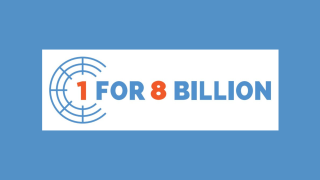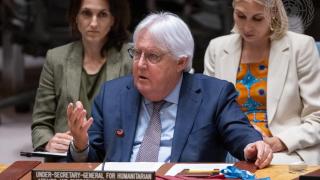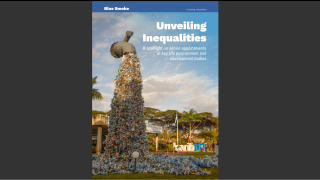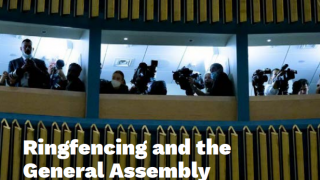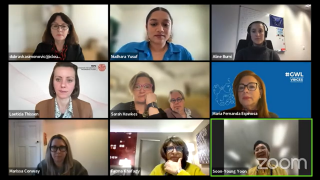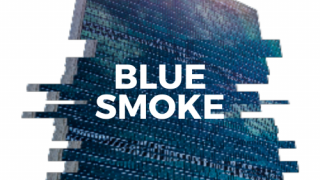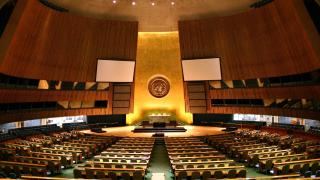
Today the UN General Assembly (GA) has adopted a resolution which makes significant progress on UNA-UK’s campaign to boost transparency and inclusivity in UN appointment processes.
While the text was replete with missed opportunities, it nonetheless makes important progress on crucial reforms relating to the Secretary-General selection process that UNA-UK has been advocating through the 1 for 8 Billion campaign - the successful campaign to open up the Secretary-General selection process co-founded by UNA-UK in 2014.
It also makes progress on proposals backed by our Blue Smoke campaign - an initiative UNA-UK co-launched last year to shine a light on appointments to senior positions across the United Nations system.
The progress was achieved under difficult circumstances and is in no small part testament to the skillful work of the co-facilitators of the Ad Hoc Working Group on the Revitalization of the General Assembly: Egriselda López, Permanent Representative of El Salvador, and Mitch Fifield, the outgoing Permanent Representative of Australia.
This article looks at the progress and missed opportunities relating to the selection process of the Secretary-General, as well as the appointment of other UN executive heads.
On the selection of the Secretary-General
Today’s resolution marks the first time the UN General Assembly has tackled the opacity surrounding Secretary-General (SG) candidates’ campaign funding. Specifically, the General Assembly “Invites candidates during future processes to voluntarily disclose any funding sources they have relating to their candidature”. This new convention, backed strongly by the ACT group of states, could reveal which candidates are the best funded, where their money is coming from and if there are conflicts of interest between funding sources and their planned policy programme which candidates are obliged to outline in their vision statement.
UNA-UK has advocated for greater transparency in candidate financing since 2016. Through our interactions with candidates during the 2016 SG selection process, we were successful in getting a voluntary disclosure from Slovenia’s candidate (Danilo Türk). We continued to campaign on this issue in subsequent years and our 2023 report on improving UN selection processes was circulated widely to states during the negotiations for this resolution. In particular it drew attention to the historical double-standard whereby senior UN leaders below the rank of Secretary-General are all mandated to make financial disclosures, and encouraged to (voluntarily) publish these disclosures - helping to scrutinise any potential conflicts of interest and build public faith in the impartiality of the UN’s leadership.
We are delighted that candidates for Secretary-General are now expected to make their own financial disclosures and we call on all candidates to observe this convention while further volunteering all relevant financial information and associations that could help reassure the UN’s membership and the public that the candidate is free from conflicts of interest. This is the minimum level of transparency that should be expected from applicants for such a vital global role, and would ensure that future Secretaries-General hold themselves to the same standard as is expected of their own senior staff.
The resolution also offers hope of more structure in future selection processes. UNA-UK, together with a wide group of progressive states, has called for a clear timetable laying out the different stages of the SG selection process. In 2016 the process was disrupted due to a late entry into the race; while the resolution stops short of establishing deadlines for the nomination of candidates, it enables the Presidents of the General Assembly and Security Council to lay out “notional events” in the selection process, which could be used to suggest a timeline for the process.
Modest progress was made on the perhaps the most pressing issue relating the appointment of the Secretary-General: the continued lack of a female Secretary-General since the UN’s founding in 1945. While two years ago, a similar resolution invited states to bear in mind the unbroken chain of male Secretaries-General when nominating candidates for the next term (2027-2031) this year’s resolution upgrades the wording from “invites” to “strongly encourages”. While this will strengthen the widely accepted view that no state should be putting forward male candidates in the next selection process, it still falls well short of explicitly asking states to only consider the nomination of female candidates
The resolution also usefully consolidates a number of positive reforms that we have championed, including the ability for more than one member state to nominate a candidate, the active participation of civil society during selection processes, the necessity of a full selection process for candidates applying for a second term in office and the UN to host a public repository of information relevant to this appointment process on its website. At present, our 1 for 8 Billion website constitutes the most thorough repository on this matter - we are delighted that the UN should soon be providing an official source for such information.
There were also a number of reforms that we pushed for that did not make the cut, including the popular proposal for the General Assembly to request multiple candidates to be recommended by the Security Council to give the UN’s wider membership a meaningful say, and the proposal for future Secretaries-General to serve a single, longer term of office. We understand from having seen earlier drafts of the resolution that positive wording suggested by states (including the ACT and NAM groupings) that would have made progress on both these reforms was nixed along the way by members of the P5 - who collaborated closely to guard the influence that they can wield when it comes to the selection of the UN’s most important employee. We reported on this in our recent Blue Smoke newsletter:
A remarkable hallmark of the negotiations was the surprising shape of the collaboration along the way. In public, Russia and China frequently trade grave allegations with Britain and the United States. Behind closed doors, the P5 caucus appears to be alive and well. Friendly cooperation and shared positions on axing wording that could puncture their privilege are the order of the day. Despite the French being in lockstep with their P4 colleagues on most of this agenda, in the main they conveniently avoided this awkward huddle since the EU negotiate as a bloc on this portfolio.”
- Read our report outlining the top 10 reforms that are needed
- Read more about these negotiations via the 1 for 8 Billion website
On the appointment of other executive heads
Working with Blue Smoke partners Strategy for Humanity and Plataforma CIPÓ, our aim is to ensure that appointments to all senior, political, and public roles at the UN are inclusive, merit-based and transparent. This is essential not only for the credibility – and therefore effectiveness – of the mandate-holder and the UN, but to help find the world’s most qualified leaders irrespective of nationality or background. Given the challenges humanity is facing, the UN cannot afford anything less.
We are pleased that the resolution will once again reaffirm that it is entirely inappropriate for certain senior positions to be ring-fenced for nationals from certain states, but as our recent briefing on this issue made clear, such wording is very weak by historical standards. We understand that much stronger language on this matter was thwarted at the last minute by members of the P5.
It is also positive that the resolution reiterates Blue Smoke’s basic mantra: the UN should follow best practices for all senior appointments, including a public call for candidates, notably women, to apply. The resolution further usefully encourages increased efforts to support gender parity and geographic distribution of the UN’s workforce “in all departments and offices and at all levels”.
One of Blue Smoke’s consistent criticisms which relates to the lack of due process and scant availability of relevant information was also addressed: the UN has now been asked by member states to provide a written update containing a description of the processes for the appointment of each executive head. This increased transparency will help states to better understand the opportunities available to nominate candidates. We are delighted that this request has been made given the status quo - where appointments are dangerously opaque, and information about them is only available in incomplete fragments. In the absence of such information Blue Smoke has put together its own repository, available here.
You can subscribe to the Blue Smoke newsletter here
Read more
- Read the resolution in full
- Learn more about Blue Smoke’s mission
- Read Blue Smoke’s Op Ed: Who runs the UN and how did they get there?
- Read Blue Smoke’s briefing about monopolies on top UN jobs
- Read our report outlining the top 10 reforms that are needed
- Read more about these negotiations via the 1 for 8 Billion website
Image: The UN's General Assembly hall (c) UN Photo

